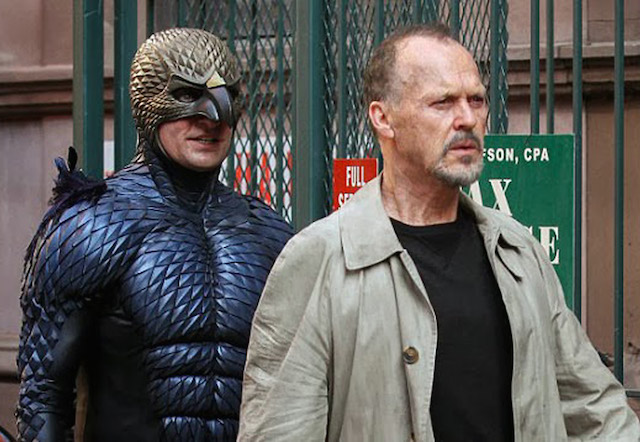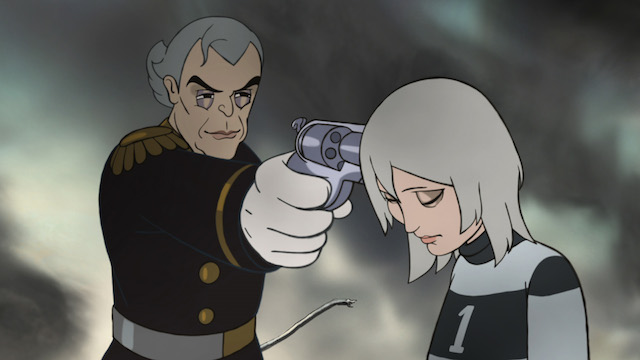It’s ironic that the films receiving the most critical praise and attention right now are about, in varying degrees, the crisis of masculinity and the difficulties of being an (important) man. This isn’t to say these films are not good.
Turist/Force Majeure (Ruben Östlund, 2014) is a compelling domestic psychodrama set in a beautifully shot Alpine resort. BiRDMAN (Alejandro González Iñárritu, 2014) is rightly observed to be a tour de force of direction, cinematography, and digital manipulation, as the film appears as a single take winding its way through the labyrinthine passages of a theatre and the mind of a writer/director/former star.
The camera moves fluidly between stage and backstage, between fantasy and reality, between egos and alter egos, gesturing to the alternations of actors and people in their roles in the play and in their lives. Given the spiral of infinite texts at play, it is no wonder that one of the characters reads Jorge Luis Borges’s Labyrinths whilst lying in a sunbed.
And the others are not bad either. Whiplash (Damien Chazelle, 2014) offers an intense drama of the relationship between a determined jazz drummer and a brutal maestro (played by the always wonderful JK Simmons who deserves all the kudos.)
Meanwhile, The Imitation Game (Morten Tyldum, 2014) is an engaging, if standard, biopic about Alan Turing featuring a bevy of attractive stars. Foxcatcher features Channing Tatum, whose portraits of masculinity as commodity are more nuanced and important than one might think—certainly more than some of his emails might suggest.) This makes him a perfect fit for a story immersed in the perverse world of wrestling which demands both strength and self-regulation stepping into body modification and mortification. And The Theory of Everything (James Marsh, 2014) has David Thewlis, so there’s that. I’ll confess I’m more entranced with the extratext that showcases actor Eddie Redmayne’s normative masculinity (and ACTING), whether in his new marriage or his excellent taste in clothing. It would seem the focus on this performance undoes whatever body positive messages might inhere to a story about the exceptionally accomplished (and apparently highly sexed) Stephen Hawking.
This isn’t even to say that stories of compromised or challenged masculinity and men aren’t welcome. Not necessarily. But this is something of an evergreen topic in cinema, in reviews, and in scholarship. (See the 1980s, when foreign policy anxieties translated into big muscles; or 1997 when the Hong Kong brought about its own spectacular depictions of crisis. I’ve linked to some good work here.) But it does sometimes seem that masculinity is perpetually in crisis, and that it is perpetually significant.
In addition, when they come at me all at once, I drown in the testosterone-driven angst of men who struggle with ‘great things’ ™. For biopics like The Imitation Game and The Theory of Everything, this often carries the ‘great man’ problem, in which history is seen as advanced through the actions of individuals rather than collective effort. In the case of Bletchley, this becomes particularly aggravating, because so much was about intellectual collaboration and labour. Meanwhile, Whiplash has generated criticism for misrepresenting not only artistic genius (not necessarily born through torture) but also jazz.
But most aggravating, or likely alienating, is the profound marginalisation of women that accompanies these stories of crisis and greatness. These characters are typically denied the complexity that their male counterparts receive. The actors who inhabit the roles may invest with them with a glimmer of life, but that does not reduce the stock elements that one must negotiate in order to appreciate them: Castrating mothers; the caring wife/girlfriend who is midwife to greatness™; angry/disappointed wives or girlfriends; the tough but broken/fragile young girl—the dark cousin to the manic pixie dream girl; mean old women who function as gatekeepers, but who will inevitably be mocked for her looks, her age, her spinsterhood, or her lack of children.
Almost all of these appear in BiRDMAN, in the form of the ex-wife, the current girlfriend, the daughter fresh out of rehab (breathing new life into another actor with her cute games of truth or dare,) and Tabitha the reviewer, played by Lindsey Duncan who couldn’t look like she had ‘licked a homeless man’s ass’ if she tried. OK, she probably could, but that’s because she’s a very good actor.
Men luxuriate in the depth of complexity their characters receive. They wrestle with questions of fatherhood, being a good partner, being a success, or what it means to be a man.
The women tend to have less to work with. For them, marriage—or the attainment of a good partner—seems to be the goal. For women, pregnancy and motherhood are unquestionably and unfailingly desirable. Force Majeure’s Ebba is confident in her place as protector to her children, with her confidence shaken only by Tomas’s own wavering.
When BiRDMAN’s Riggan receives the news his girlfriend and co-star Laura is pregnant, he receives the benefit of a close-up that registers his ambivalence. Andrea Riseborough does an admirable job, but suffers from a lack of parity. After all, what would pregnancy mean for an actress whose play is about to preview? Maybe she, too, has fears over what parenthood entails?
Thanks to the The Babadook (Jennifer Kent, 2014) with Essie Davis’s gorgeous performance, not to mention Obvious Child (Gillian Robespierre, 2014) these concerns do get their due in the cinema. But praised as they are, they are not receiving the bombastic praise of their male counterparts, particularly in light of the distinctions in genre. (Horror and rom-coms tend not to hold the same prestige as biopic or psychological drama.)
This commitment to the domestic is probably why their career aspirations rarely register. Jane Hawking’s sacrifice of her arts PhD for a caretaker role is minimised and naturalised within a story that has love and Hawking’s seemingly boundless genius triumph. And although based in reality, the subject of medieval Iberian poetry doesn’t possess the urgency of time’s origins—at least, not in a context where humanities and arts are increasingly devalued. And BiRDMAN’s Leslie, played by Naomi Watts, cuts a curious figure. Thrilled to be achieving her dream of treading Broadway’s boards, she seems to express little doubt or urgency or history of struggle. Indeed, Watts seems to be little more than a retread of Mulholland Drive’s ingénue, Betty (Naomi Watts), but played here in earnest.
That said, some more intelligent than I may rightly dispute this last claim through an observation of BiRDMAN’s intertextuality. Boyhood (Richard Linklater, 2014) definitely deserves credit, then, for depicting a woman who wrestle with the domestic and the professional, calling attention to the penury that faces those of us in academe to boot.
And this is when women appear at all; they are just as often pushed to the margins: a girlfriend posing a distraction to greatness (Whiplash), or the memory of an overbearing mother (Foxcatcher).
The thing about crisis is that it tends to end in a reestablishment of the status quo. It offers a tantalising story of upset in order to justify the urgency with which the dominant reasserts itself. Consider the debacle around the Sony hack and The Interview (Evan Goldbeg and Seth Rogen, 2014.) Information is released that illustrates the sexism and racism embedded in the industry, but the story soon focuses on industrial vulnerability and the rights of journalists to comment on this material.
Moreover, with the alleged threats on cinemas and the ensuing decision to cancel screenings, the story becomes one of an embattled freedom of speech. It may be so, but it is hard to think of Seth Rogen as one of the more imperilled figures when it comes to receiving a platform for attention. Power is momentarily destabilised but the narrative soon restores that ‘balance’. After all, it was mere days before the film (as well as its copious gay jokes and tragic lack of Danny McBride) was streaming into homes everywhere.
And in terms of the balance, these many (some excellent) films about masculinity in crisis are released into a world where men still reign. Some may wonder why I have not referenced Unbroken and Selma, directed by Angelina Jolie and Ava DuVernay respectively. I might once I see them. It would be interesting to see if these great men stories change with the gender of the director. But Unbroken is not receiving the same amount of praise at the moment (despite ticking all the boxes) and Selma’s appreciation seems to be overwhelmed by debates over historical accuracy, the least interesting argument around a biopic.
Jolie and DuVernay not withstanding, it remains a world where women struggle to gain a foothold in the industry and where passing the Bechdel test is still a shocking rarity (even if not a guarantee of feminist content.) The films may tell meaningful and powerful stories, but when meaningful, powerful, and greatness remain the principal domains of men, it can also be a bit wearying.
BiRDMAN screenshot courtesy of Alejandro González Iñárritu. All rights reserved.





